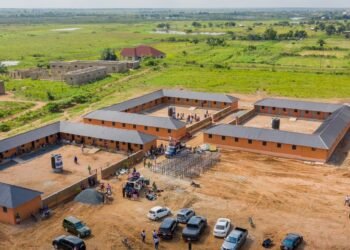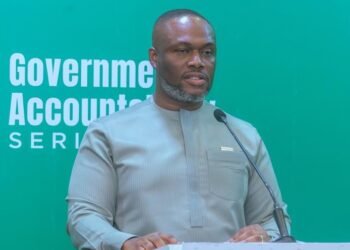The Minister for Education, Honourable Haruna Iddrisu, has announced that the government, through the Ghana Education Trust Fund (GETFund), has allocated GH¢40 million as seed funding to support four emerging public universities across the country.
This initiative, he explained, is aimed at strengthening the institutional capacities of the beneficiary universities to meet the country’s growing educational and developmental needs.
Speaking at the 5th Congregation of the C.K. Tedam University of Technology and Applied Sciences (CKT-UTAS) in the Upper East Region, Hon. Iddrisu stated that the allocation of the GH¢40 million is a clear demonstration of the government’s commitment to the strategic development of tertiary education.
The universities to benefit from this support are the C.K. Tedam University of Technology and Applied Sciences, the University of Energy and Natural Resources (UNER), the University of Health and Allied Sciences (UHAS), and the Simon Diedong Dombo University of Business and Integrated Development Studies (SD-UBIDS).
The Minister noted that the funding will serve as a critical stimulus for the expansion of infrastructure, improvement of learning environments, and enhancement of research and academic capacity in these young universities.

According to him, the government recognises the indispensable role these institutions play in shaping Ghana’s future workforce, fostering innovation, and addressing regional disparities in access to quality higher education.
“This government is fully committed to nurturing our young public universities, ensuring they have the necessary resources to develop and provide quality education that meets the demands of our evolving economy”.
Hon. Haruna Iddrisu, Ghana’s Minister for Education
The Education Minister’s announcement comes at a time when Ghana’s tertiary education sector continues to grapple with a number of challenges, particularly in relation to inadequate infrastructure, limited access to funding for research, and the growing pressure to align academic output with national development priorities.
For the newly established institutions, these challenges are often more acute, as they strive to establish their reputations, attract qualified staff, and build modern academic environments from the ground up.
Targeted Investment
Hon. Haruna Iddrisu underscored the importance of targeted investments in tertiary education, noting that the country’s economic transformation agenda cannot be achieved without a strong foundation in science, technology, health, energy, and business education.

He commended the leadership of the four universities for their resilience and ongoing efforts to provide quality education despite their resource limitations.
In particular, the Minister praised CKT-UTAS for its contributions to technology and applied sciences education in the Upper East Region.
He described the university as a critical pillar in Ghana’s quest to expand access to STEM education across all regions, particularly in underserved areas.
He pledged the government’s continued support to ensure that the institution not only survives but thrives in its mission to transform local economies through innovation and research.
The GH¢40 million seed money, he explained, will be disbursed in phases and managed in collaboration with the respective university councils to ensure transparency and effective utilisation.
The funds will primarily focus on upgrading academic infrastructure, such as laboratories, lecture halls, libraries, and ICT facilities.
A portion of the allocation will also be directed at staff development, research funding, and student support services, which are essential for improving the overall quality of education and attracting top-tier faculty and students.
The new NDC administration, led by President Mahama, since assumption to power have underscored the need for a fair distribution of tertiary institutions and resources throughout all regions as Ghana competes in a global economy that is becoming more and more knowledge-based.

They contend that this strategy will promote regional economic growth, lessen educational inequality, and slow urban migration.
This larger strategic vision is reflected in the government’s most latest intervention, which places a strong emphasis on building resilient and inclusive public universities that can meet the unique needs of their local communities.
READ ALSO: Ghana Has Over Two Months of Fuel Reserves — NPA Boss























